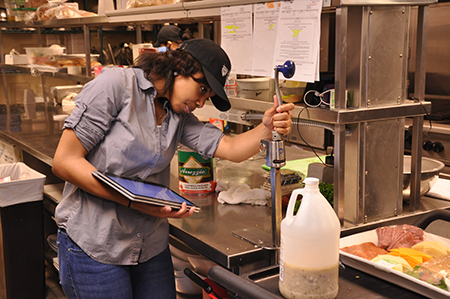The Cutting Edge of Medical Technology Content, Community & Collaboration
Food inspections occupy a position of primacy among the FDA’s list of mechanisms aimed at maintaining and enhancing food safety. Since it is the sole regulatory body in the US for food, it is natural that the FDA attaches the highest importance to ensuring the safety and efficacy of food that is consumed across the nation.
Towards ensuring this, the FDA has initiated a number of plans and strategies. A seamless, informal and micro level activity in this list is risk-based food inspections. Risk-based food inspections start by identifying the risk factors inherent in the food chain. Risk-based food inspections need to be carried out at all levels at which food is produced and consumed, making it a task of mammoth proportions.
Compliance with HACCP guidelines is necessary
Risk-based food inspections need to be carried out in accordance with the practices and guidelines established by the Hazard Analysis and Critical Control Points (HACCP) manual. The FDA looks for a HACCP-oriented approach to carrying out risk-based food inspections.
The first task in carrying out risk-based food inspections is to identify the sources of contamination, of which there are several. The FDA expects its regulatory program managers to carry out field tests in virtually every food establishment across the length and breadth of the nation.
Locating a pin in a haystack, if necessary
When carrying out risk-based food inspections; these managers have to look for every possible source of risk to which food can be subjected. These are just some of the sources from which food can get contaminated, meaning that these are the points at which to carry out risk-based food inspections:
 https://compliance4all14.files.wordpress.com/2018/07/ferah-pix.jpg?w=150 150w, https://compliance4all14.files.wordpress.com/2018/07/ferah-pix.jpg?... 300w" sizes="(max-width: 356px) 85vw, 356px" />
https://compliance4all14.files.wordpress.com/2018/07/ferah-pix.jpg?w=150 150w, https://compliance4all14.files.wordpress.com/2018/07/ferah-pix.jpg?... 300w" sizes="(max-width: 356px) 85vw, 356px" />
Active management control
The FDA acknowledges that all food has some or another kind of contamination. So, during risk-based food inspections, it has to be convinced that the food outlet is taking the right steps to contain this contamination. This action, called active managerial control, is a principle that is at the root of risk-based food inspections. The FDA seeks to ensure that a food facility has put in place and is implementing an active management control system.
This is what risk-based food inspections should facilitate. A properly implemented active managerial control is arrived at after a thorough and careful assessment of the food organization’s points of contamination.
In order to properly evaluate this, regulatory managers and food inspectors need to probe what measures are being taken by the organization to have an active managerial control in place. Any step that serves the purpose of identifying, reducing, preventing or eliminating food safety hazards is considered as serving the purpose of an active managerial control by risk-based food inspections.
 https://compliance4all14.files.wordpress.com/2018/07/foodspicture1.jpg?w=150 150w, https://compliance4all14.files.wordpress.com/2018/07/foodspicture1.... 300w" sizes="(max-width: 450px) 85vw, 450px" />
https://compliance4all14.files.wordpress.com/2018/07/foodspicture1.jpg?w=150 150w, https://compliance4all14.files.wordpress.com/2018/07/foodspicture1.... 300w" sizes="(max-width: 450px) 85vw, 450px" />
Regulatory managers and food inspectors need to use their discretion in judging whether the active management controls are sufficient and effective. For this to happen, risk-based food inspections have to be done after a careful understanding of the entire food preparation process.
Many steps to an active management controls regime
Risk-based food inspections look for loopholes in activities and steps that are taken to ensure that food is free of contamination and safe for consumption, which can include:
For Reference http://www.fda.gov/downloads/Food/GuidanceRegulation/UCM078159.pdf
Views: 12
Comment
© 2024 Created by CC-Conrad Clyburn-MedForeSight.
Powered by
![]()
You need to be a member of MedTech I.Q. to add comments!
Join MedTech I.Q.